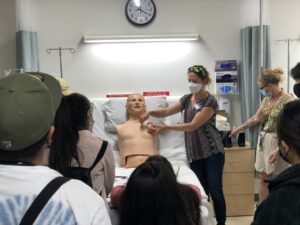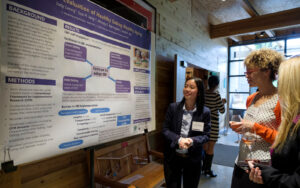
NPs AT THE HEART OF HEALTHCARE
During November 10-16, we celebrate National Nurse Practitioner Week. Our nurse practitioner graduates are integral leaders in diverse healthcare settings, translating leading-edge research into better patient outcomes. We are proud to share their stories and impact in enhancing health care quality and access. We also celebrate advanced practitioners across the nation and their contributions to societal health and wellness.
Doctor of Nursing Practice Students
Our program equips advanced practice nurses to provide high-quality care to individuals and communities across the lifespan. Our students develop strong leadership, clinical and investigative skills, translating scientific knowledge into practice for better decision-making. At our school, DNP students develop the ability to innovate boldly, collaborate inter-professionally, and shape health policy at the local and global level, improving accessibility and quality of care for all. Read more about some of our amazing DNP students below.
Why did you choose to purse an advanced practice degree? I saw that so much change was needed and wanted to learn how to effectively make those changes.
Why did you chose your track? I ended up choosing FNP because they can make change on the population level and the individual level.
How you do you think advanced practice nurses contribute to better patient, population, leadership, research, or policy outcomes?Advanced practice nurses bring an essential combination of expertise and lived experience to the table. Having worked at the bedside, they’ve witnessed firsthand the impacts of healthcare gaps, policy shortcomings, and systemic issues on patients’ lives. This perspective allows them to approach care not just clinically but also empathetically, understanding the human side of every health statistic.
Why did you choose to purse an advanced practice degree? The Doctor of Nursing Practice degree will prepare me to bridge the gap between research and practice, ensuring that my care is grounded in the latest evidence and best practices. I aspire to be a leader who not only provides direct patient care but also shapes healthcare policies and practices. Ultimately, my goal is to enhance patient outcomes and contribute to meaningful improvements in health care delivery.
Why did you chose your track? I love pediatrics and the ambulatory setting, so it was an easy decision to apply for the pediatric PC track. I like the continuity of care the primary care setting provides.
What are your career plans after graduation? I plan to practice in a primary care office to start. I’d also like to participate in community outreach in local schools.
How you do you think advanced practice nurses contribute to better patient, population, leadership, research, or policy outcomes? I think ARNPs and DNPs have a unique approach to patient care and understand patients and families in a holistic way, which allows more complete and coordinated care. DNPs also have training and experience in completing research projects to improve clinical practice.
Why did you choose to purse an advanced practice degree? I wanted to be a better advocate for my patients.
What are your career plans after graduation? I want to work in a clinic in my community.
How you do you think advanced practice nurses contribute to better patient, population, leadership, research, or policy outcomes? Advanced Practice Nurses take on more of a leadership role which opens more doors and allows opportunities to make the policy changes that lead directly to better patient outcomes.
Why did you choose to purse an advanced practice degree? Working as a tech at a local behavioral health hospital I met a nurse practitioner who loved her job and the impact she had on the lives of those she served. She shared about her scope of practice, which really fit perfectly with my career aspirations and inspired me to pursue an advanced degree.
What are your career plans after graduation?Upon graduation, my aim is to either join an ARNP Fellowship to further refine my skills as a Psychiatric Mental Health Nurse Practitioner or to work in a setting that allows me to continue my dedication to serving marginalized populations. My ultimate goal is to ensure equitable access to high-quality mental health care for underserved communities, where disparities in treatment are often the greatest. I am deeply committed to addressing these inequalities, advocating for culturally sensitive, patient-centered care, and ultimately improving mental health outcomes for those who need it most.
Listen to two DNP Psychiatric Mental Health Nurse Practitioner alumni share their DNP experience.
There are more than 385,000 NPs licensed in the U.S
Doctor of Nursing Practice Professionals
Our community of DNP professionals – which includes alumni, preceptors and clinical instructors – works together to prepare our future DNP leaders with hands-on experience in top healthcare settings. Our alumni work in various settings from clinical to policy making and are leaders in health care who strive make a difference. Read more about some of these outstanding and dedicated health leaders below.
 Why did you choose to become an NP? I worked in mental health and addiction recovery as an RN for several years. Colleagues and patient encounters inspired me to deepen my knowledge to join the provider side of mental health care.
Why did you choose to become an NP? I worked in mental health and addiction recovery as an RN for several years. Colleagues and patient encounters inspired me to deepen my knowledge to join the provider side of mental health care.
In your work, how do you think NPs contribute to better patient or community outcomes? I think NPs are able to see patients from a holistic angle and can be “down to earth” and works well for patients for shared-decision making around their healthcare. NPs also increase access in fields that patients otherwise wouldn’t have providers at all, and those factors better patient and community outcomes.
 What are the clinical paths for NPs? NPs can practice in a variety of clinical settings, academic and research settings, and population health focused organizations. Within all of these settings, NPs can work in both frontline staff positions and in management and leadership positions.
What are the clinical paths for NPs? NPs can practice in a variety of clinical settings, academic and research settings, and population health focused organizations. Within all of these settings, NPs can work in both frontline staff positions and in management and leadership positions.
Anything else you’d like to share about being a NP? I have been a NP for 45 years and would not trade my career and the opportunities I have had for any other profession. I spent the first 15 years of my career as an NP working in a variety of school, health department, and home health clinical settings before working in program management and organizational leadership. My training and experiences as a NP on the frontlines working to improve the health and well-being of individuals, families, and communities has informed and been the foundation of all that I have done in my career.
 Why did you choose to become a NP? Honestly, I get bored really easily and am always looking for a new challenge. During COVID I felt the urge to get back in the classroom. At that point I had a bachelor’s degree so knew it was time to pursue a Master’s or Doctorate. When thinking about my options I knew I didn’t want to do research and that I didn’t want to be in patient care 100% of the time. I’m very passionate about quality, safety and improving patient outcomes so that Pediatric Clinical Nurse Specialist track was a really good fit.
Why did you choose to become a NP? Honestly, I get bored really easily and am always looking for a new challenge. During COVID I felt the urge to get back in the classroom. At that point I had a bachelor’s degree so knew it was time to pursue a Master’s or Doctorate. When thinking about my options I knew I didn’t want to do research and that I didn’t want to be in patient care 100% of the time. I’m very passionate about quality, safety and improving patient outcomes so that Pediatric Clinical Nurse Specialist track was a really good fit.
What are the career paths for NPs? Up until the time I graduated I believed that since I was going to school for such a specialty niche degree that my options would be limited. I was the 150th person in the country to pass the Pediatric CNS exam. After graduation I realized that I could do anything and that I don’t have to work as a CNS just because that is what my license, education and credentials are for. I recently accepted a position as a nurse consultant for Accreditation and Regulatory Compliance.
 Why did you chose to be a NP? I worked as a pediatric nurse for eight years before starting NP school. I got to a point where I knew I was in the right field, but I wanted to do and learn more. So I returned to school to become a pediatric NP to grow as a healthcare provider and broaden my scope of practice.
Why did you chose to be a NP? I worked as a pediatric nurse for eight years before starting NP school. I got to a point where I knew I was in the right field, but I wanted to do and learn more. So I returned to school to become a pediatric NP to grow as a healthcare provider and broaden my scope of practice.
What are the career paths for NPs?
Sometimes the number and variety of NP career paths can feel overwhelming, but it’s actually very exciting. There is a perfect role for every NP depending on their goals and priorities. NPs can work inpatient (ex: ICU), outpatient (ex: primary care), both. They can choose to specialize (ex: surgery) or teach (clinical or classroom).
I chose to become an NP because I love improving the well-being of children, and this was the best way I knew how to implement that. I loved being a nurse, but being an NP really brings it to a whole new level.






